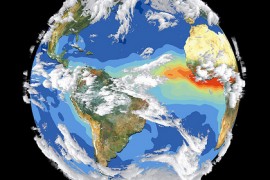BBC Media Action has spent an astonishing £500,000 on a cod survey in Asia that is designed to spread alarm about climate change among some of the world’s most vulnerable communities. Its methodology is so laughably inept that it doesn’t bear a moment’s scrutiny: how can lay respondents know with certainty (as the survey asked them) how much local climate has changed?
For the uninitiated, BBC Media Action was set up in 2011 to work alongside the BBC World Service in delivering desirable change in developing countries. It claims to be an ‘independent body’, but is funded by taxes because much of its money comes from the Department for International Development and the EU. Further, at least half its board of Trustees is actually nominated by the BBC. The current chairman, Peter Horrocks (a former editor of Newsnight) is also in charge of the BBC World Service broadcasting operation.
News-watch has been investigating Media Action (and its predecessor body, the World Service Trust) for several years. News of the Asian surveywas posted two months ago on the News-watch website, and it has also been noted that its activities were likely to be intensified with the influx of £20m of funds from backers such as the EU – and also because the World Service is expanding massively. The goal is to double the audience in five years.
That may well presage more of the Asian style surveys. If so, it will amount to blatant climate change alarmism on an unprecedented scale.
Most appalling s is that Media Action is deliberately targeting vulnerable young people, with the effect of inculcating a hugely negative worldview and a deep loathing for capitalism. The Asian report is full of unmitigated gloom and threatens famine, drought and disease on a massive scale. Despite the mental damage it causes, targeting the impressionable young has always been regarded as legitimate by those with extreme political causes because – like Prince Charles – they believe they are ‘saving the world’ and that validates any tactics, no matter how repugnant or morally questionable.
John Whittingdale, the chairman of the Commons media and culture committee, the main parliamentary BBC watchdog, professes that he is ‘astonished’ that the survey was authorised and claims it is a waste of money. But with respect to this very fair-minded man, it seems that he and his committee colleagues have been fast asleep on their watch.
The reality is that Media Action works as it does because it has the backing of the highest levels of the BBC. Here’s the evidence:
Alison Hastings, the Trustee who chairs the editorial standards committee (ESC), the internal editorial watchdog, issued a Trustee statement four years ago which, in effect, said that those who disagree with climate change alarmism would get only very limited exposure because there was a ‘consensus’ that they were wrong.
Diana Coyle, the current Trustees deputy chairman, who is hoping to become the next chairman, is a stakeholder advisor to EDF Energy, a company which is working systematically to harvest as much cash as possible from the government for renewable and green energy provision.
Richard Ayre, a colleague of Ms Hastings on the ESC, was a career BBC journalist before becoming a quangocrat. He is also is a former chairman (2003-5) of a body called Article 19. This fights for freedom of expression, but like many such leftist organisations, also has a major climate change alarmist agenda. Its website declares:
At the national level, greening the economy will include improving fiscal policy reform, reducing environmentally harmful subsidies, employing new market–‐based instruments, and targeting public Investments to “green” key sectors.
Finally, the most recent recruit to the ESC and the Trustees.Is Nick Prettejohn, His career is in the financial services sector, and he has recently also been appointed chairman of Scottish Widows Group. His new company website states:
Fundamentally SWIP believes that strong climate policies from governments are the essential pre-requisite to addressing climate risk. Without strong climate policies we will fail to mitigate climate change.
So, to recap. The BBC has been caught red-handed spending half a million pounds on a project specifically designed to spread climate change alarm and panic among some of the world’s most disadvantaged communities.
But, chilling as this is, the evidence is not actually hidden, nor is it new. It is going on blatantly in broad daylight, aided and abetted by Trustees who are seemingly hell-bent on a climate change crusade.
So when is Mr Whittingdale, and his committee going to wake up and intervene? The BBC itself won’t change because the rot is in the inside from the very top downwards. The only hope is that Parliament will act with the teeth it sadly only sometimes bares. BBC Media Action has spent an astonishing £500,000 on a cod survey in Asia that is designed to spread alarm about climate change among some of the world’s most vulnerable communities. Its methodology is so laughably inept that it doesn’t bear a moment’s scrutiny: how can lay respondents know with certainty (as the survey asked them) how much local climate has changed?
For the uninitiated, BBC Media Action was set up in 2011 to work alongside the BBC World Service in delivering desirable change in developing countries. It claims to be an ‘independent body’, but is funded by taxes because much of its money comes from the Department for International Development and the EU. Further, at least half its board of Trustees is actually nominated by the BBC. The current chairman, Peter Horrocks (a former editor of Newsnight) is also in charge of the BBC World Service broadcasting operation.
News-watch has been investigating Media Action (and its predecessor body, the World Service Trust) for several years. News of the Asian surveywas posted two months ago on the News-watch website, and it has also been noted that its activities were likely to be intensified with the influx of £20m of funds from backers such as the EU – and also because the World Service is expanding massively. The goal is to double the audience in five years.
That may well presage more of the Asian style surveys. If so, it will amount to blatant climate change alarmism on an unprecedented scale.
Most appalling s is that Media Action is deliberately targeting vulnerable young people, with the effect of inculcating a hugely negative worldview and a deep loathing for capitalism. The Asian report is full of unmitigated gloom and threatens famine, drought and disease on a massive scale. Despite the mental damage it causes, targeting the impressionable young has always been regarded as legitimate by those with extreme political causes because – like Prince Charles – they believe they are ‘saving the world’ and that validates any tactics, no matter how repugnant or morally questionable.
John Whittingdale, the chairman of the Commons media and culture committee, the main parliamentary BBC watchdog, professes that he is ’astonished’ that the survey was authorised and claims it is a waste of money. But with respect to this very fair-minded man, it seems that he and his committee colleagues have been fast asleep on their watch.
The reality is that Media Action works as it does because it has the backing of the highest levels of the BBC. Here’s the evidence:
Alison Hastings, the Trustee who chairs the editorial standards committee (ESC), the internal editorial watchdog, issued a Trustee statement four years ago which, in effect, said that those who disagree with climate change alarmism would get only very limited exposure because there was a ‘consensus’ that they were wrong.
Diana Coyle, the current Trustees deputy chairman, who is hoping to become the next chairman, is a stakeholder advisor to EDF Energy, a company which is working systematically to harvest as much cash as possible from the government for renewable and green energy provision.
Richard Ayre, a colleague of Ms Hastings on the ESC, was a career BBC journalist before becoming a quangocrat. He is also is a former chairman (2003-5) of a body called Article 19. This fights for freedom of expression, but like many such leftist organisations, also has a major climate change alarmist agenda. Its website declares:
At the national level, greening the economy will include improving fiscal policy reform, reducing environmentally harmful subsidies, employing new market–‐based instruments, and targeting public Investments to “green” key sectors.
Finally, the most recent recruit to the ESC and the Trustees.Is Nick Prettejohn, His career is in the financial services sector, and he has recently also been appointed chairman of Scottish Widows Group. His new company website states:
Fundamentally SWIP believes that strong climate policies from governments are the essential pre-requisite to addressing climate risk. Without strong climate policies we will fail to mitigate climate change.
So, to recap. The BBC has been caught red-handed spending half a million pounds on a project specifically designed to spread climate change alarm and panic among some of the world’s most disadvantaged communities.
But, chilling as this is, the evidence is not actually hidden, nor is it new. It is going on blatantly in broad daylight, aided and abetted by Trustees who are seemingly hell-bent on a climate change crusade.
So when is Mr Whittingdale, and his committee going to wake up and intervene? The BBC itself won’t change because the rot is in the inside from the very top downwards. The only hope is that Parliament will act with the teeth it sadly only sometimes bares.
Photo by ToastyKen 










